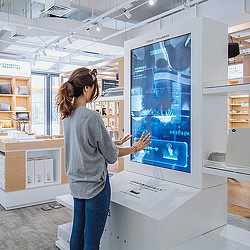Empower Your Business With The Magic Of Machine Learning!
- +30 210 9701777
- Aristotelous 83, Athens 163 43
- contact@mobiplus.co
Empower Your Business With The Magic Of Machine Learning!

Retailers are continuously looking for new and inventive methods to enhance consumer experiences and increase sales in the constantly changing retail environment.
In-store personalization is one of the best methods to accomplish these objectives.
The process of personalizing each customer’s purchasing experience in-store based on their unique tastes and demands is known as in-store personalization.
In order to deliver tailored recommendations, promotions, and experiences that are appealing to each consumer, this includes leveraging customer data.
It is impossible to emphasize the value of in-store personalization in the retail industry.
Customers want shops to provide them individualized experiences that are catered to their special needs and tastes now since they are more demanding and smart than ever.
Retailers can meet these expectations and provide their consumers a more delightful and fulfilling shopping experience by using in-store personalization.
Also, it helps retailers to differentiate out in a crowded market by setting themselves apart from their competitors.
Retailers will boost sales and revenues, enhance consumer insights, raise customer pleasure, and optimize operations by personalizing the in-store experience.
We will examine the main advantages of in-store personalization for retailers in this post, as well as how they may use these advantages to grow their businesses.
Explanation of In-Store Personalization
With in-store personalization , each customer’s purchasing experience is personalized based on their own interests, behaviors, and past purchases.
In order to deliver tailored recommendations, promotions, and experiences that are appealing to each consumer, this is done by combining cutting-edge technology with customer purchase data.
Many methods of in-store personalization exist, such as tailored product recommendations, focused advertising campaigns, and personalized displays and signs.
A consumer may, for instance, visit a retail establishment and be welcomed with a personalized display of goods that are catered to their particular requirements and tastes, depending on their prior purchasing history ,online activity , banking transactions ,social media activity and personal appearance.
According on the customer’s unique interests and preferences, they may also get tailored product recommendations and promotions.
Customers are meant to have a more enjoyable and rewarding shopping experience thanks to in-store personalization.
Retailers may foster closer relationships with their consumers, boost customer happiness and loyalty, and enhance sales and profitability by offering customers tailored experiences that are relevant and engaging to them.
Retailers of all sizes and from all sectors are embracing in-store personalization, which is a crucial element of contemporary retail.
It has never been simpler for retailers to use consumer data to provide tailored experiences for their customers because to the growth of big data and sophisticated analytics.
In-store personalization is therefore set to play a crucial part in the future of retail, and merchants must use this technology to their advantage to remain ahead of the competition.
One cannot exaggerate the significance of in-store personalization in the retail industry. Some of the main advantages of in-store personalization are listed below:
Enhancing Customer Satisfaction:
In-store personalization enables businesses to provide consumers customized experiences based on their unique requirements and preferences. This contributes to a more enjoyable and fulfilling shopping experience, which in turn results in a rise in client loyalty and pleasure.
Boosting Sales and Revenues:
By making it more likely for consumers to make a purchase, targeted promotions and personalized product suggestions may help raise sales and income for shops.
Streamlining Processes:
Retailers may simplify their procedures and improve their operations by leveraging consumer data to provide tailored experiences. This contributes to cost savings, efficiency growth, and an all-around better customer experience.
Improving Customer Insights:
In-store personalization enables retailers to collect useful information on consumer preferences and behaviors, which can be utilized to increase customer insights and better understand their target market.
Providing tailored experiences allows merchants to set themselves apart from the competition and stand out in a competitive market. This might contribute to a better brand image and an increase in brand awareness.
Finally, in-store personalization is a crucial element of contemporary retail and has the potential to considerably boost consumer insights, raise sales and profitability, and significantly improve the customer experience.
Retailers that successfully use in-store personalization will have a market edge and be better prepared for success in the future.
We examine the main advantages in detail in the sections that follow.

A. Customized Client Experiences:
Customers get in-store personalized experiences that are catered to their particular requirements and preferences. This include tailored in-store displays and signage, targeted promotions, and personalized product recommendations.
Retailers may create a more enjoyable shopping experience and boost customer satisfaction by offering consumers experiences that are relevant to and interesting to them.
B. Increased Consumer Engagement:
By making the purchasing experience more engaging and relevant, personalized experiences assist to raise customer engagement. This results in a more pleasurable purchasing experience, which in turn boosts client loyalty and satisfaction.

C. Enhanced Loyalty and Trust:
By giving consumers individualized experiences, companies may forge closer bonds with their clientele. As a result, consumers feel valued and appreciated, which increases their trust and loyalty. Also, as consumers are more likely to return to a business that offers them a tailored experience, personalized experiences may aid in decreasing customer churn and increasing customer retention.
In conclusion, a significant advantage of in-store customisation is enhanced consumer happiness. Retailers may provide their consumers a more fulfilling shopping experience, which in turn boosts sales and profitability, by offering individualized customer experiences, enhancing customer engagement, and building customer trust and loyalty.

A Increased Product Visibility:
By using customer data to personalize product recommendations and in-store displays, retailers can increase the visibility of certain products. This leads to increased sales and revenue, as customers are more likely to discover and purchase products that they may not have otherwise considered.
B. Improved Up-Selling and Cross-Selling:
Personalized product recommendations and targeted promotions can help retailers to improve up-selling and cross-selling efforts.
By recommending complementary products or suggesting higher-end products, retailers can increase the average purchase value, leading to increased sales and revenue.
C. Increased Conversion Rates:
Personalized experiences help to increase the likelihood that customers will make a purchase. By providing customers with experiences that are relevant and appealing to them, retailers can increase the conversion rate, leading to increased sales and revenue.
In conclusion, improved sales and revenues are a key benefit of in-store personalization. By increasing product visibility, improving up-selling and cross-selling, and increasing conversion rates, retailers can drive sales and improve profitability.

A.Effective Inventory Management:
By acquiring additional shopping information on consumer preferences and purchasing patterns from stores, in-store personalization may assist businesses in managing their inventory more effectively. Making better judgments regarding product procurement and replenishment using this information will result in better inventory control and less waste.
B. Improved Customer Data Management:
Personalization necessitates the gathering and analysis of consumer information, which may assist businesses in improving their customer data management. Retailers may boost customer engagement and happiness by using consumer data from stores to better understand customer preferences and habits.
C.Better Decision-Making :
Retailers will benefit from important insights into consumer preferences and behavior via in store personalization, which can guide decision-making. As a result, merchants may be better able to source products, manage inventories, execute marketing campaigns, and make other important choices that enhance operations and boost profitability.
In conclusion, another significant advantage of in-store customisation is simplifying processes. Retailers may boost efficiency and profit through enhancing inventory management, better managing consumer data, and decision-making.

A .Better Customer Insights :
Deeper understanding of the customer is possible thanks to in-store personalization, which enables businesses to learn important information about consumer preferences and behavior. Retailers may increase their awareness of client wants and preferences by utilizing customer data from stores and feedback, which will result in more effective marketing and higher levels of customer satisfaction.
B. Improved Customer Segmentation:
By allowing merchants to segment their consumers according to their tastes and habits, personalization helps them to more effectively focus their marketing efforts. Retailers may enhance consumer engagement and boost the efficacy of their marketing initiatives by customizing marketing messaging and product suggestions to particular customer categories.
D. Enhanced Client Retention:
By giving consumers individualized experiences, businesses may raise client happiness and forge closer bonds with their clients. As they are more inclined to do so, consumers are more likely to remain loyal to the store and boost customer retention.
As a result, improved consumer insights are a significant advantage of in-store customisation. Retailers may enhance their connection with consumers and maximize profitability by better understanding their needs, effectively segmenting their client base, and enhancing customer retention.
Read our book and learn why instore personalization and shopping data is the name of the game.

In-store personalization has the ability to transform the retail industry by enabling retailers to personalize customer experience and enhance consumer engagement.
The major advantages of in-store personalization include increased customer satisfaction, better sales and marketing, simpler operations, and enhanced consumer insights, among others.
The Future of Retail In-Store Personalization
The potential for in-store personalization will grow as technology advances. Retailers will be able to use more advanced technology, such as artificial intelligence and machine learning, to deliver even more personalized experiences for their consumers.
This will result in enhanced customer engagement, more sales and profitability, and more effective operations.
In-store personalization is a key retail sector trend that has the ability to greatly enhance the consumer experience and fuel company expansion.
Those that accept this trend and invest in the required technology will be well-positioned to win in an ever-more-competitive marketplace.
mobiplus member Elevate Greece
Confirmed Innovation.

Test out the Recommendation Engine for up to 20.000 euros in revenue from recommendations. No credit card required. Just enter your company information and we’ll contact you with all the details.